If you click on a link and make a purchase we may receive a small commission. Read our editorial policy.
X-Men family secrets revealed and Blood Hunt’s chronology conundrum in this week’s Marvel Watcher Report
The Watcher’s Report: The biggest changes in Marvel Comics this week

Popverse's top stories
- Minneapolis comic & bookstore owner Greg Ketter emerges as a symbol of protest against ICE actions
- Wonder Man is the Andor of Marvel Studios’ modern TV series on Disney+
- With Marvel Tokon, Wolverine, and 1943: Rise of Hydra, 2026 will either be the best year for Marvel Games, or the most disappointing [Gamify My Life]
Welcome to the Watcher Report, our weekly breakdown of Marvel’s biggest comic book moments from the current batch of releases. Like Uatu the Watcher, each week I observe everything that goes down in the Marvel Universe. That means reading every Marvel release and cataloging the most startling, exciting, and amusing developments.
This week, a longtime X-Men mystery may have been solved, as the Summers family tree got a more complicated. Plus, Blood Hunt’s ending was (possibly) spoiled and the Fantastic Four started a grocery war (?!). Let’s dive into the Watcher’s Report for the week of May 8 for more..
Warning: Spoilers ahead!
Keep up to date on Popverse's Marvel coverage, with these highlights:
- The MCU needs Anya Taylor-Joy's Magik in it (and not just for the X-Men connection)
- How Disney+'s What If...? is the moonshot for the next 50 years of Marvel Studios & the MCU
- Marvel Studios has accidentally created a new Phase that predates Phases 1 - 6: the MCU Phase Zero
- Overgrown children of the atom: Marvel's X-Men can't evolve past their '90s commercial peak
- The biggest outstanding questions of the Marvel Studios' movies & TV shows
- Donald Trump is the landlord for Marvel's House of Ideas
- Marvel Studios swapping out Doctor Doom for Kang offers the chance to jettison the Multiverse Saga
- What Marvel Studios boss Kevin Feige is saying (and not saying) about the MCU X-Men franchise says a lot about the future of the Mutant Saga
- If Marvel is going to bring Loki back for Secret Wars, it's time to give him an upgrade
- In 2021, Sony's boss said people won't miss Spider-Man in its Spider-adjacent movie. Turns out, they do.
This week’s biggest revelation: X-Men family secrets revealed

The complicated Summers family tree is a cornerstone of the X-Men mythos. If you thought the Summers family history was complicated before, X-Men Forever #3 (written by Kieron Gillen and penciled by Luca Maresca) has added a new wrinkle.
Hope Summers is the adopted daughter of Cable. Born in the present day, Cable raised Hope in the distant future. This technically makes her Scott Summers and Jean Grey’s granddaughter. Not much is known about Hope’s biological parents. We know that her mother was a firefighter named Louise Spalding, but the identity of her father remains unknown. However, X-Men Forever #3 gives us another piece of the puzzle.
The villain Enigma time-travels nine months prior to Hope’s birth and meets up with Louise Spalding in a bar. “I’m here to talk about your pregnancy,” Enigma says. “I’m not pregnant,” Louise replies. “You aren’t yet. Let’s talk about that,” Enigma says. The issue ends before we see what comes next.
The narration indicates that Enigma is pulling a Terminator, traveling back to prevent Hope’s conception. However, there is another way to read into this. Is it possible that Enigma is planning on impregnating Louise himself? The dialogue could be read that way. Enigma’s mission is to stop Hope, but perhaps there is another piece to the puzzle we’re missing. Maybe Enigma is trying to add his genetics to the Summers family tree as a failsafe. Don’t forget, Enigma is a clone of Mister Sinister, who has tampered with the Summers family tree before, inadvertently causing the creation of Cable (it’s complicated).
If Enigma isn’t Hope’s father, then X-Men Forever #4 should give us more clues to his true identity. After all, if Enigma mission is to stop Hope’s conception, we have to imagine that her father would somehow be involved in this time-travel plot.
This week’s chronology conundrum: Um, when does Blood Hunt take place?
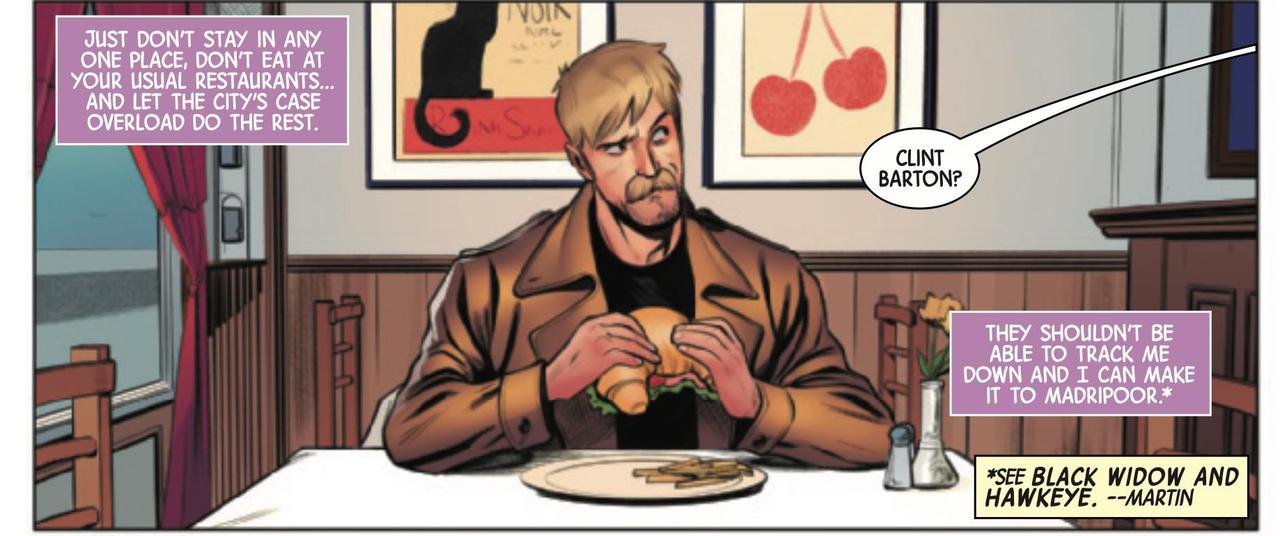
Blood Hunt is Marvel’s latest crossover storyline, but it looks like the ending may have been spoiled two months ago. This week, Marvel published a tie-in title, Blood Hunters #1, which featured a Hawkeye story by Mark Russell and Bob Quinn. Clint Barton fights off vampires as he prepares to make his way to Madripoor. Hawkeye is hoping to hide out there since he’s currently wanted for the murder of a U.N. Ambassador.
This is referencing the storyline that’s currently running in the Black Widow & Hawkeye mini-series from Stephanie Phillips and Paolo Villanelli. However, this seems to imply that the series takes place after Blood Hunt has concluded. Clint references trying to make it to Madripoor, which is where we find him when Black Widow & Hawkeye begins. Since the sun is back and there are no vampires in the mini, we can assume that the vampire invasion is over as of Black Widow & Hawkeye #1.
The mini-series begins 48 hours after Clint murdered (or was framed for murdering) the U.N. ambassador, which means Blood Hunt’s vampire invasion will be solved in less than two days. I suppose this spoils the ending to Blood Hunt, but to be fair, we all assumed that heroes would prevail, and the vampires would be stopped. However, there are some other explanations. Maybe Clint returns to the United States at the end of the Black Widow & Hawkeye mini-series but plans to go to Madripoor again. Maybe Black Widow & Hawkeye ends without Clint clearing his name.
Another bit of chronology confusion occurs with Clint’s facial hair. Hawkeye has grown a mustache to disguise himself while he’s a fugitive. This mustache is nowhere to be seen in Black Widow & Hawkeye. Plus, I find it hard to believe that Clint would be able to grow it in two days. This would be easy to reconcile if Blood Hunters #1 took place after Black Widow & Hawkeye, but Clint’s fugitive status and the reference to Madripoor imply otherwise. Is this an editorial mix-up, or does Black Widow & Hawkeye casually spoil the ending to Blood Hunt? It depends on how Black Widow & Hawkeye ends, but for now, evidence suggests that the mini is our first look at the post-Blood Hunt universe.
This week’s most fun book: The Fantastic Four have a grocery war
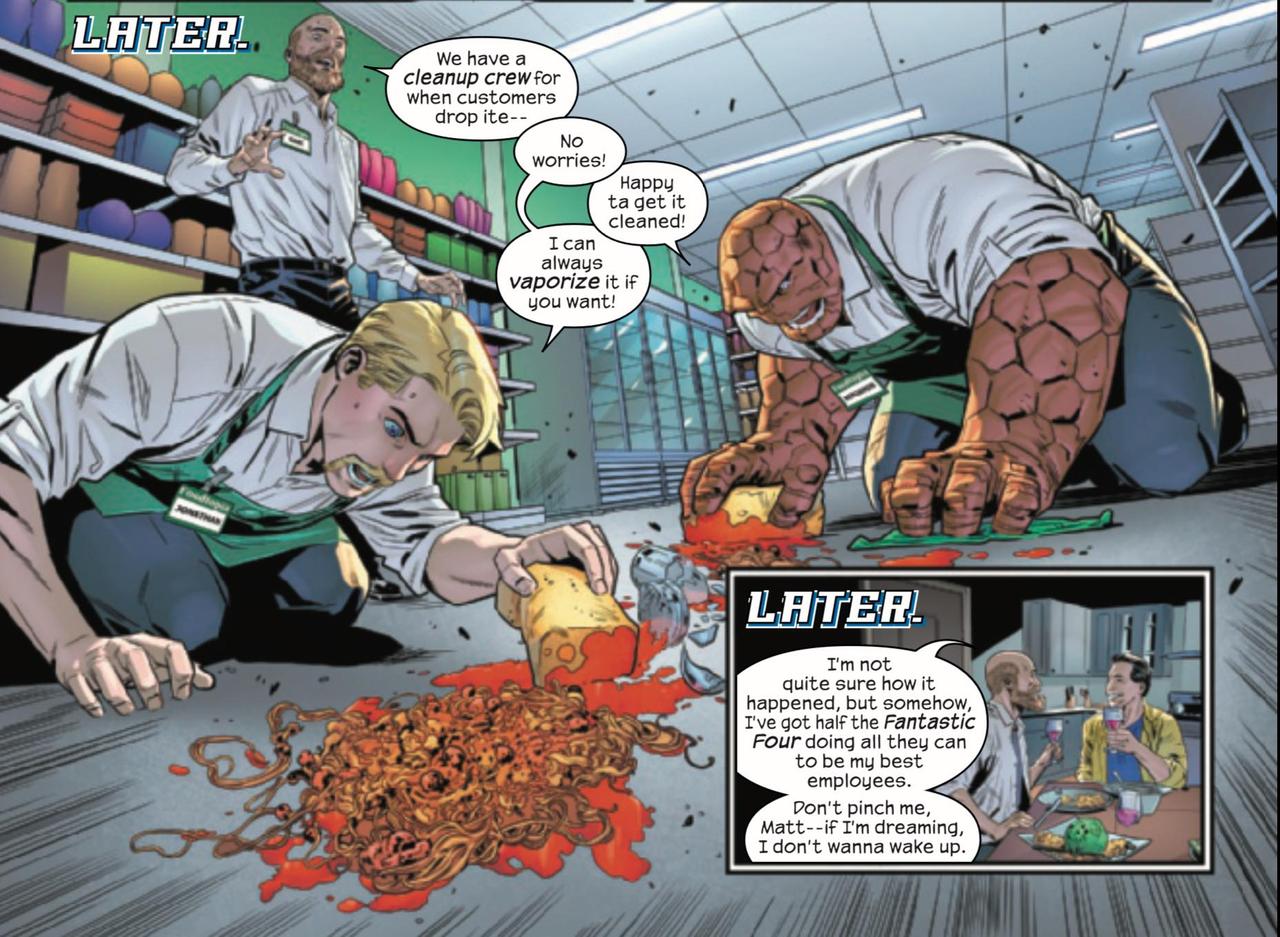
We’re almost halfway through 2024, and so far Fantastic Four #20 (written by Ryan North and penciled by Carlos Gomez) is the most fun I’ve had reading a comic this year. The Fantastic Four have recently fallen on hard times. Recent public relations problems have made them pariahs, and numerous financial liens have dwindled the team’s resources. The FF are currently living on a farm in Arizona.
This means that Johnny Storm and Ben Grimm need to get jobs. The two heroes wind up becoming cashiers at a grocery store called Foodtopia. However, it doesn’t take long for their rivalry to rear its head, and the two begin competing to see who could be the best cashier. They immediately go overboard, rushing into work early, being overtly courteous to every customer, and even staying late to cleanup spills. “I’m not quite sure how it happened, but somehow I’ve got half the Fantastic Four doing all they can to be my best employees,” the Foodtopia manager says.
The stakes have never been lower, but that only adds to the drama. Don’t sleep on Ryan North’s Fantastic Four run, because it’s some of the most fun you’ll ever have reading comics.
This week’s grossest moment: A decomposing zombie symbiote
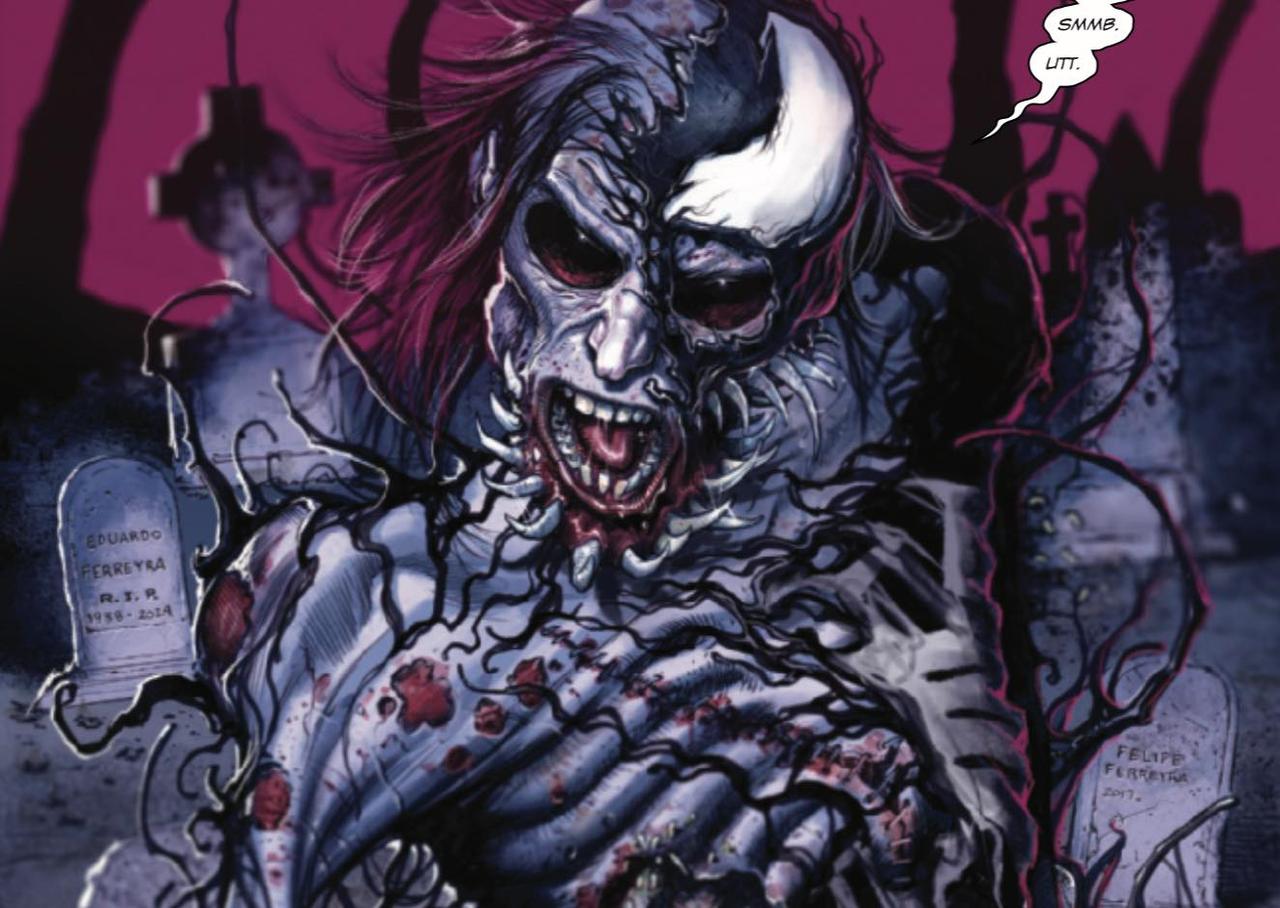
The Marvel Universe might be in the middle of a vampire invasion, but they haven’t forgotten about zombies. Venom #33 (written by Al Ewing and penciled by Juan Ferreryra) features the return of Lee Price, a former criminal who had a brief stint as Venom. Price was killed by Carnage in the 2019 Spider-Man/Venom Free Comic Book Day special, but death is never the end in Marvel.
This week, a villain named Threkker reanimated Price’s corpse, which was already partially decomposed. The Venom symbiote (recently separated from Dylan Brock) is horrified to see what has become of its former host. “Random vocalizations from what was once a human throat. Lee was autopsied and embalmed. Nothing human could remain in there,” the symbiote says.
As Lee’s corpse approaches the symbiote, it appears to be coming apart. Lee still has remnants of the Mania symbiote, which try to keep the body together, but there isn’t a lot of body left. In essence, Lee is nothing more than a meat puppet in Threkker’s plan to trap the Venom symbiote.
Continuity cop watch: A chronologically impossible Spider-Man and Sandman encounter
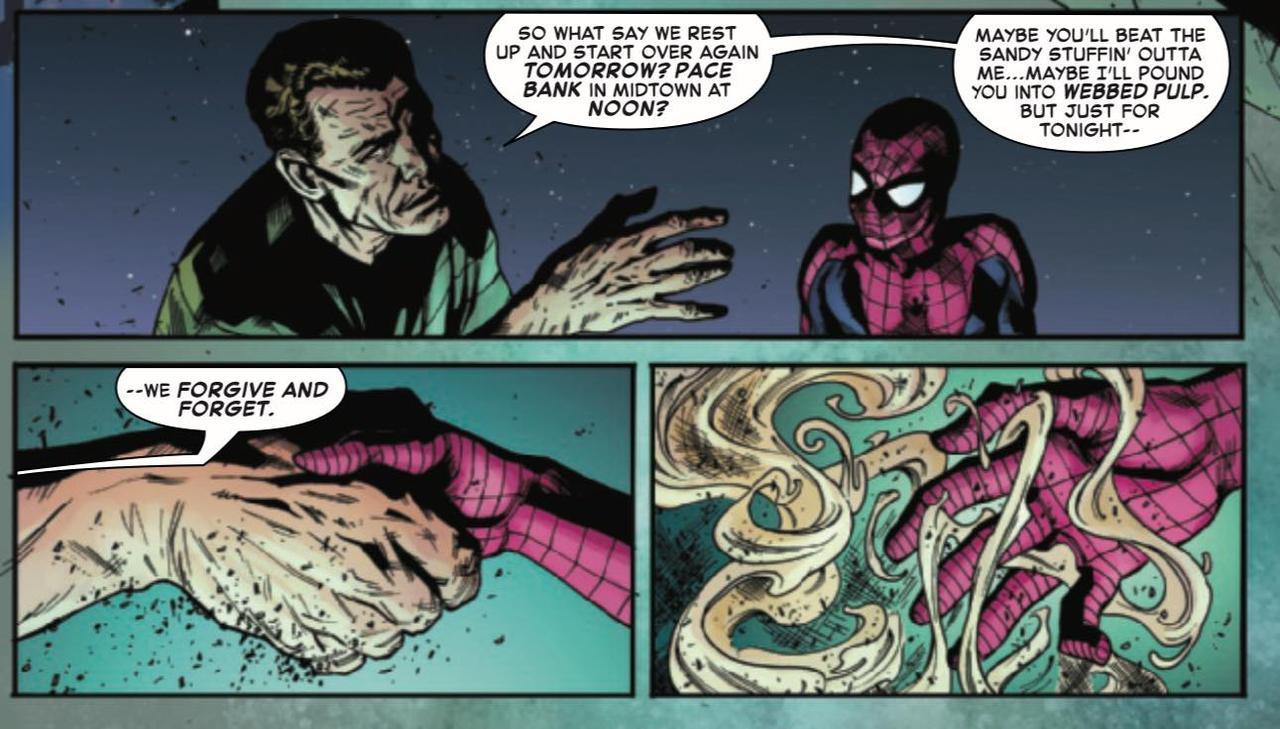
Spider-Man: Shadow of the Green Goblin is a mini-series that takes place in the early days of Spidey’s career. This means that the limited series has to navigate the continuity of Stan Lee and Steve Ditko’s Amazing Spider-Man run, as well as the various other flashback stories that Marvel has published. That’s a lot of canon to dance around without making a mistake.
Spider-Man: Shadow of the Green Goblin #2 (written by J.M. DeMatteis and penciled by Michael Sta. Maria) tries to dance around the continuity but makes a stumble. During the issue, Spider-Man and Sandman pause a battle to have a heart-to-heart conversation. They agree to meet again in 24 hours to resume their battle, but it wasn’t meant to be. “Sandman ended up getting himself captured the next day by that glory hog the Human Torch, of all people,” Spider-Man narrates. This is referencing Strange Tales #115 (1963), but that’s where things get tricky.
Untold Tales of Spider-Man #3 (1995) is set immediately after Strange Tales #115, and Spider-Man and Sandman act like they haven’t seen one another since Amazing Spider-Man #4 (1963). Plus, Untold Tales of Spider-Man #3 opens with Peter Parker removing the arm-sling he received in Amazing Spider-Man #7 (1963). Despite taking place one day prior to Strange Tales #115/Untold Tales of Spider-Man #3, Peter’s arm-sling is nowhere to be seen in Spider-Man: Shadow of the Green Goblin #2.
(Okay, I’ll admit this is VERY knit-picky. But this is continuity cop watch, where we get nerdy about things like this)
Normally I would be handing out a continuity cop citation, but J.M. DeMatteis put the perfect loophole in the first issue of the mini. Spider-Man: Shadow of the Green Goblin is narrated by Peter Parker sometime in the future, and during the first issue he said, ““I’ve pieced it together from my own memories, firsthand accounts from some of the others involved, news reports – and, yes, unsubstantiated rumors. It may not be one hundred percent accurate, but that doesn’t mean it isn’t true.”
This means we can just chalk up any continuity hiccups to Spider-Man’s poor memory. Maybe he’s misremembering the time placement of his conversation with Sandman. Since this case is extremely knit-picky, and DeMatteis created the perfect loophole, the continuity cop is letting him off with a warning instead of a citation. Plus, I love DeMatteis and this mini has been entertaining.
That’s it for this week’s report. Popverse’s Watcher (that’s me!) will return next week to break down the latest developments in the Marvel Universe. See you then…
Advance copies of this week’s Marvel books were provided ahead of release by Marvel.
Keep up to date on Popverse's Marvel coverage, with these highlights:
- The MCU needs Anya Taylor-Joy's Magik in it (and not just for the X-Men connection)
- How Disney+'s What If...? is the moonshot for the next 50 years of Marvel Studios & the MCU
- Marvel Studios has accidentally created a new Phase that predates Phases 1 - 6: the MCU Phase Zero
- Overgrown children of the atom: Marvel's X-Men can't evolve past their '90s commercial peak
- The biggest outstanding questions of the Marvel Studios' movies & TV shows
- Donald Trump is the landlord for Marvel's House of Ideas
- Marvel Studios swapping out Doctor Doom for Kang offers the chance to jettison the Multiverse Saga
- What Marvel Studios boss Kevin Feige is saying (and not saying) about the MCU X-Men franchise says a lot about the future of the Mutant Saga
- If Marvel is going to bring Loki back for Secret Wars, it's time to give him an upgrade
- In 2021, Sony's boss said people won't miss Spider-Man in its Spider-adjacent movie. Turns out, they do.
Follow Popverse for upcoming event coverage and news
Find out how we conduct our review by reading our review policy
Let Popverse be your tour guide through the wilderness of pop culture
Sign in and let us help you find your new favorite thing.





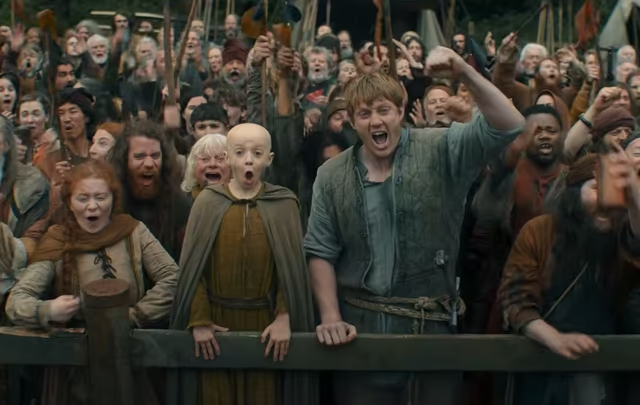










Comments
Want to join the discussion? Please activate your account first.
Visit Reedpop ID if you need to resend the confirmation email.